Spray in the nose for a runny nose. Sprays with a vasoconstrictor effect. Names of sprays for nasal congestion
Inflammation of the nasal mucosa has wide range pathogens. It is the responsibility of the otolaryngologist to identify the etiology of rhinitis and the sensitivity of pathogenic strains, on the basis of which to prescribe the most effective spray.
The patient’s further condition depends on how well the medicine is selected. The article presents short review effective suspensions that are widely used in ENT practice.
Violation of the integrity of the internal nasal membrane accompanied by swelling of soft tissues, congestion, abundant production of muconasal secretion. The pharmacological industry provides a wide variety of drugs for the treatment of sinusitis in the form of tablets, sprays, drops, and ointments.
Nasal aerosols are in great demand. Medicinal substances in the form of small particles settle on the mucous membrane when sprayed. Dispersed irrigation allows you to treat the maximum projection of the nasal cavity, affecting the internal parts paranasal sinuses with low fluid consumption.
They are simple and easy to use; there is no need to take a horizontal position or calculate the dosage. Modern means combine the properties of symptomatic and etiotropic treatment, are characterized by complex activity and local action.
According to the main therapeutic use All medications are divided into the following groups:
- sympathomimetics;
- antihistamines;
- antiseptic;
- anti-inflammatory;
- antibacterial;
- moisturizing;
- hormonal;
- immunomodulatory;
- homeopathic.
Catalysts for rhinitis are bacterial and respiratory infection, allergies, benign neoplasms, unfavorable living/working conditions, thermal parameters. Therefore, which spray is better for a runny nose is determined by the etiology of damage to the upper respiratory tract.
When administering the aerosol, you must close one nostril, pressing lightly with your finger.
Which cold spray for adults should I choose?
When selecting a medication, the doctor focuses on the patient’s physiology, clinical form manifestations and course of pathology. Effective medicine in one case will be ineffective or may cause side effects in another patient.
Vasoconstrictors
Sympathomimetics are among the emergency assistance for nasal congestion. Decongestants act on alpha-adrenergic receptors, a short time reduce spasm in smooth muscle muscles, relieve symptoms of rhinorrhea and soft tissue swelling, and restore natural nasal communication with the outside world.
For reference! When choosing an aerosol, you need to consult a doctor, because... long-term use may cause drug-induced rhinitis.
The classification of representatives of this group is based on the duration of action of the main component. The following line of vasoconstrictor sprays is distinguished:
- " ". Characteristic pharmaceutical product comes down to high efficiency and minimum cost (30 rubles per bottle). The active substance is naphazoline, exhibits long action (up to 6 hours) compared to adrenaline. Side effects appear dizziness, tachycardia, headache. Not prescribed for children in the first year of life, patients prone to arterial hypertension, diabetes mellitus, atherosclerosis, chronic rhinitis. The list of analogues includes “” and “Nafazolin”.
- " ". Sympathomimetic with the active ingredient xylometazoline. It has a wide range of indications and is used to restore the upper respiratory tract of various etiologies of acute and chronic form. With intranasal administration, there is a possibility of absorption into the systemic circulation. Possible side effects from the central nervous system, of cardio-vascular system, respiratory organs. “Tizin Xylo”, “Snoop”, “”, “, “Doctor Theiss Rhinotaiss” have a similar therapeutic effect.
- "Nazol". The main synthetic substance is oxymetazoline, characterized by a long-term therapeutic effect. Shows activity as a vasoconstrictor and decongestant. Additional components moisturize the mucous membrane, prevent irritation and drying out. The downside is the relatively high cost for a small volume of medicinal liquid. Similar properties Possesses "", "Vicks Active Sinex", "Noxprey". Among the entire list, “Nesolin” stands out favorably, price for 20 ml. bottle varies between 80 rubles.
Effective spray from chronic runny nose should be sought among vasoconstrictors. The best option To increase aeration of the nasal sinuses, neutralize inflammation and swelling of soft tissues, cheap aerosols based on naphazoline are used - “Naphthyzin”, “Sanorin”, “Naphazolin”.
Moisturizing sprays
The main composition of the medicinal liquid is isotonic sea solution with admixtures of useful microelements potassium, calcium, magnesium, zinc, sodium chloride, selenium, zinc. Used for preventive or therapeutic purposes.
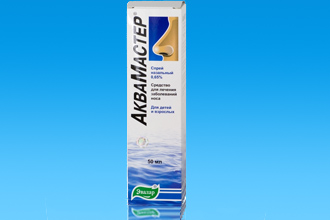
Suspension based sea water"Aquamaris" flushes out the remains of mucus and pathogens from the nasal sinuses
The natural composition has a positive effect on the condition of the mucous membrane, moisturizes the nasal epithelium, accelerates the process of regeneration of soft tissues, and increases the therapeutic effectiveness of medications. By stimulating mucociliary clearance, local immunity is formed.
Isotonic water is allowed for use from the first days of the baby’s life, pregnant and lactating. The composition is well tolerated by patients and practically does not cause adverse reactions, provided there is no hypersensitivity of the body to the components.
The duration of use depends on the form of progression of the pathology, can be prescribed for up to 2 months. Aerosols are non-addictive and gently care for the inner lining of the nose, supporting natural level humidity.
Advice!"Sodium Chloride" therapeutic properties is not inferior to expensive pharmacy products.
When choosing an effective nasal product in this group, you need to focus only on the price range and volume of the bottle. So, the price for “” spray is 30 ml. starts from 279 rub. average cost“Humer 150” for children – 550-650 rubles, for adults – 500-600, “Marimer forte” nasal aerosol 100 ml. – 371 rub.
More affordable, but no less effective, are the drugs “No-Sol”, “Morenazal”, “Aqua-Rinosol”, “AquaMaster”, “Nazol Aqua”.
Antibiotic nasal spray
Modern means show bacteriostatic activity against a wide range of pathogenic microflora. Due to the presence of potent components in the composition, it is used as a means of monotherapy or included in complex treatment.
In the treatment of runny nose of bacterial or infectious origin, it is mainly used three antimicrobial agents:
- " ". Most viruses and bacteria of ENT diseases are sensitive to the action of framycetin. The development of resistance to the active component is practically absent. IN medical practice recorded isolated cases manifestations of systemic reactions. Limiting the use of nasal medication Requires pregnancy and breastfeeding.
- " ". A triple combination of polymyxin, neomycin and dexamethasone enhances therapeutic effect antibiotic. Quickly eliminates the symptoms of rhinitis, normalizes the patient's condition, and accelerates the regression process. Indications for use are inflammation of the upper respiratory tract and damage to the projection of the middle ear. Does not provide systemic action. It is not recommended for use if the eardrum is atrophied or absent.
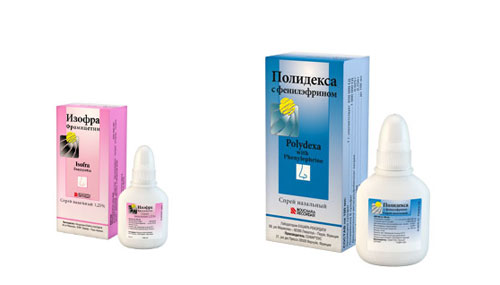
Effective nasal antibiotics for restoring the upper respiratory tract in rhinitis of infectious etiology
- " ". The main medicinal effect is complemented by the anti-inflammatory effect. Antibiotic local impact based on fusafungine does not participate in hemocirculation. Disrupts the metabolic process cellular level microorganisms localized in the projection of the nasal cavity and nasopharynx, therefore it is equipped with two attachments: for the nose and throat. Not typical for antibiotics drug interactions with other drugs. Not excluded side effects from the side of the medication: dry mucous membranes, cough, vomiting, throat irritation, soft tissue swelling, allergic reactions. In Russian pharmacies, Bioparox can be purchased for an average of 450 rubles, which is twice as expensive as its analogues.
Combined action aerosols
To achieve rapid regression, drugs with fixed combinations are prescribed active ingredients. Among their advantages– ease of use, increasing the effectiveness of treatment. Most often, the spectrum of activity includes anti-inflammatory, secretolytic, mucolytic effects.
The following nasal agents have a pronounced therapeutic effect:
- « ». Medicinal composition forms phenylephrine, which eliminates nasal congestion and dimethindene, blocks the activity of H-1 histamine receptors. Wide Application in otolaryngology to relieve symptoms of rhinitis of various etiologies provides triple action: vasoconstrictor, antiallergic and decongestant. The manufacturer's instructions indicate among the side effects the possibility of itching and burning in the nasal cavity after irrigation.
- « ». Pharmacological effect manifests itself through stimulation of tissue epithelization, anti-inflammatory and antiseptic effects. Belongs to the group natural preparations , which are used for acute and chronic rhinitis. The suspension contains butylated hydroxyanisole, which can cause irritation. skin, eyes, nasal mucosa.
- " ". The presence of mucolytic changes biological properties pathological secretion, dilutes sputum and facilitates its evacuation. The alpha-blocker neutralizes the signs of rhinorrhea, relieves inflammation and hyperemia of soft tissues, and restores drainage function.
Advice! Concomitant use of Rinofluimucil with MAO inhibitors and TCAs is contraindicated. Prescribe with caution to patients with arterial hypertension, closed-angle glaucoma, or an allergic reaction.

The drug for plant based has a gentle effect on the mucous membrane, accelerates the process of epithelization of soft tissues
Conclusion
A good spray for a runny nose is a drug that has high therapeutic effectiveness with the minimum possible side effects, affects the cause pathological disorders, quickly normalizes the patient's natural state.
If we focus on the price-quality ratio, the first positions are occupied by the vasoconstrictor nasal suspension "Naphthyzin", the moisturizer "Aquamaris", the complex action drug "Vibrocil".
Buy necessary drug You can buy it at any pharmacy, and you don’t need a doctor’s prescription to buy the spray. But it’s important not just to buy a good anti-runny nose spray, but to choose a really suitable one medicine, which is suitable for the treatment of a specific disease.
What are sprays?
Nasal spray - This special shape release medicinal product, which has its own characteristics. Unlike classic drops, a spray or aerosol is a mixture of tiny medicinal components, which is sprayed under a certain pressure onto the nasal mucosa.
During the procedure, the patient does not need to take horizontal position and independently calculate the exact dosage of the drug. The spray is convenient in that it can be used anywhere, in a standard dose - one injection into each nasal passage (provided there are no other recommendations from the attending physician).
How does the spray act on the nasal mucosa?
A nasal spray differs from drops in its more complete coverage of the inflamed surface of the nasal mucosa. Medicinal components The nasal spray is not poured into the nasopharynx, but is sprayed evenly into it, working directly at the source of inflammation, including spreading to the paranasal sinuses. The active components of the drug are able to penetrate the smallest blood vessels, creating the necessary therapeutic or symptomatic effect.
Types of sprays for runny nose
A nasal spray for the treatment of a runny nose should not be selected based on the principle of which is better, but depending on the cause of the disease that caused the development. These drugs are chosen taking into account age characteristics, a person’s health status and susceptibility to specific medications.
Types of nasal sprays:
- (). They are used quite widely. Their main task is to eliminate swelling of the mucous membrane by narrowing blood vessels and return the patient to normal nasal breathing and sense of smell. The drugs are effective, but easily addictive.
- Antiallergic sprays (). They are classified into vasoconstrictor, hormonal and combined depending on the effectiveness and the task.
- Anti-inflammatory and antibacterial sprays (). Prescribed for the treatment of bacterial and purulent rhinitis.
- Moisturizing sprays (,). Carefully care for the nasal cavity, relieve swelling, and moisturize the mucous membrane. They usually contain sea water and plant extracts.
- Homeopathic sprays (Euphorbium compositum). Their composition is based solely on natural ingredients. Therefore, this group of drugs is considered the safest, provided that the patient’s body is not hypersensitive to the individual ingredients of the drug. Prescribed in conjunction with traditional methods treatment.
- Combined sprays (, Isofra). These drugs have a combination of several active ingredients and can simultaneously have vasoconstrictor, antibacterial and anti-inflammatory effects.
Allergy sprays
A spray cannot cure allergies. Treatment should be carried out using specific immunotherapy, but antiallergic aerosols in this case will be a good auxiliary base based on antihistamine and hormonal components.
Aflubin naze
Affordable and effective remedy of natural origin, the task of which is to combat allergy symptoms. The active ingredients of the drug are mustard, spurge, luffa, mercury iodide and meadow lumbago. Aflubin naze is a representative of homeopathy, but despite this, it should not be prescribed during pregnancy or for children under 12 years of age.
The drug eliminates nasal congestion and restores nasal breathing. Besides allergic rhinitis, Aflubin naze is prescribed to combat acute rhinitis, sinusitis and eustachitis.
Avamis
Hormonal decongestant spray allergic nature. The active substance is fluticasone furoate, a glucocorticosteroid. When administered intranasally, the drug acts on specific mucosal receptors, reducing the body's hyperreaction to allergenic factors. Avamys is contraindicated in children under 2 years of age and is prescribed with caution to expectant mothers.
Vibrocil
A combined drug with a vasoconstrictor and antiallergic effect. Active ingredients: phenylephrine, dimethindene maleate. Unlike other nasal sprays in this group, it has a more gentle effect on the mucous membrane, eliminating signs of a runny nose. It is not recommended for pregnant women and children under 6 years of age.
Sprays for sinusitis
They have an antibacterial effect, promote additional production and thinning of mucus.
Miramistin
Antiseptic drug active against staphylococci and streptococci. The product is used to rinse the nasopharynx, promoting a speedy recovery. Allowed to everyone without exception, even expectant mothers.
Sinuforte
Nasal spray based on natural ingredients, which has rhinosecretory-stimulating, rhinosecretolytic and anti-edematous effects. The active substance is cyclamen juice and extract. The drug thins mucus and promotes its removal, including from the paranasal sinuses. Often use allows you to avoid. The drug is contraindicated during pregnancy and children under 5 years of age.
Cyclamenos
Efficient and affordable drug, prescribed for the prevention of rhinitis, sinusitis and sinusitis. The spray contains cyclamen extract, essential oils tea tree, eucalyptus and ginger, camphor and vitamins. When the drug is sprayed into the nasal cavity, irritation of the mucous membrane occurs, followed by a rapid outflow of mucus and pus. Cyclamenos is contraindicated for expectant mothers and children under 12 years of age.
Polydexa with phenylephrine
A complex drug that has anti-inflammatory, antibacterial and vasoconstrictor effects. The active components of the drug are polymyxin, neomycin, dexamethasone and phenylephrine. Prescribed for bacterial infections of the nose and nasopharynx. Polydexa with phenylephrine can be prescribed to children from 2.5 years of age.
Isofra
Local antibacterial drug, the active component of which is framecithin sulfate. The main task of this tool is bactericidal effect, aimed at destroying the cells of most gram-positive and gram-negative flora. Appointed to complex therapy rhinitis and sinusitis of a bacterial nature.
Nasal rinsing sprays
They contain sea water.
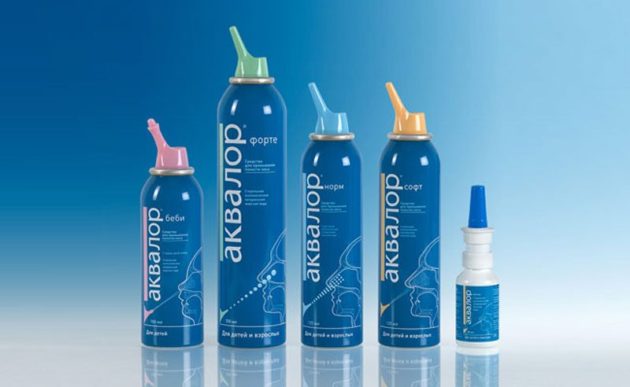
Aqua Normin
A drug created for hygiene and prevention of rhinitis, which can be caused by allergens, viruses and bacteria. Aqua Normin is created on the basis of Adriatic Sea water containing natural salts and trace elements. The drug is safe for use, so it is prescribed to expectant mothers.
Aqualor
Safe means for rinsing the nasal cavity. Aqualor contains an isotonic solution and sea water. The spray normalizes nasal breathing, carefully cleanses the nasal mucosa from pathogenic microflora, allergens and fungi. The product thins mucus and dry crusts, reduces nasal swelling, has an anti-inflammatory and moisturizing effect, normalizing the state of local immunity.
Morenasal
A product for intranasal use, recommended for hygiene of the nasal cavity, including before using other medications. Preliminary cleansing of the nasopharyngeal mucosa with Morenasal improves the effectiveness of other agents. In addition, the drug increases the resistance of the nasal mucosa to bacteria, viruses and allergens.
Sprays for nasal congestion
They have a vasoconstrictor effect.
Lazolvan Rino
Nasal spray Lazolvan Rino quickly and effectively relieves signs of rhinitis on long time with gentle influence on the nasopharyngeal mucosa and minimum dosage active substance. In addition to xylometazoline hydrochloride, the drug contains menthol, eucalyptus and camphor, due to which nasal breathing is not only restored, but also refreshed.
Afrin
Nasal decongestion spray with oxymetazoline. The drug removes swelling of the nasopharynx in 15 minutes. Because of high cost has not gained popularity among consumers. Prescribed for rhinitis, sinusitis, etc.
Otrivin
A vasoconstrictor for the common cold, characterized by a long-term effect. The active ingredient is xylometazoline hydrochloride. Otrivin eliminates the symptoms of nasal congestion and restores breathing. Prescribed when acute rhinitis, sinusitis, and eustachitis.
Vicks Active Sinex
The drug has a gentle effect on the nasopharyngeal mucosa thanks to the components included in its composition: aloe vera, eucalyptol and levomenthol. The spray successfully relieves swelling and moisturizes the nasopharyngeal mucosa.
Rhinonorm
The drug contains a vasoconstrictor component - xylometazoline hydrochloride. successfully used in ENT practice, causing constriction of blood vessels, reducing hyperemia and swelling of the nasal mucosa. The spray reduces the production of nasal secretions, working for a long time - about 8 hours. Prescribed for acute and chronic rhinitis, sinusitis.
Snoop
Nasal spray based on xylometazoline hydrochloride and sea water. The latter enhances the anti-edematous effect and additionally moisturizes the nasopharyngeal mucosa. The drug is prescribed for acute and chronic pathologies nose
Galazolin
An affordable and no less effective drug, used for a long time in otolaryngology. The active ingredient is xylometazoline hydrochloride. The drug copes with its task within a few minutes after use, successfully eliminating nasal congestion.
Xylene
An affordable spray that effectively relieves nasal congestion. The active ingredient is xylometazoline hydrochloride. The drug begins to work almost immediately after use, maintaining the results for a long time.
Rinofluimucil
The drug contains the vasoconstrictor component tuaminoheptane and the mucolytic acetylsysteine. actively dilutes mucous secretions and pus in the nasal cavity, has anti-inflammatory and antioxidant effects. Indicated for the treatment of sinusitis, and.
Moisturizing nasal sprays
They contain sea water, the salt concentration is low.
Aqua Maris
Spray for regular nasal hygiene, containing salts of the Adriatic Sea. The drug cleanses the mucous membrane of dust, viruses and bacteria, while moisturizing it.
AquaMaster
Transparent remedy for rhinitis with almond aroma. The drug moisturizes and cleanses the nasal cavity, normalizes breathing. Can be used for daily nasal hygiene before using other medications.

Sprays for polyps
They are hormonal drugs.
Nazarel
Nasonex
Anti-inflammatory and antiallergic drug, the active substance is mometasone furoate. The course of treatment can significantly reduce the size of polyps, normalize nasal breathing and sense of smell.
Antiviral sprays
Prescribed for the treatment of viral infections.
Derinat
An immunomodulatory drug with an antiviral effect. well absorbed by the body. When prescribed in combination with antibiotics, the drug fights viruses in the nasal cavity.
Interferon – Genferon Light
The drug contains interferon, which has antiviral and immunostimulating effects, as well as taurine, which normalizes metabolism in cells. The product is effective for the prevention and treatment of acute respiratory viral infections and influenza.
Cold sprays for children
For uncomplicated rhinitis, children are prescribed nasal rinses with saline solutions.
Aqualor Baby
Can be used from the first days of a child's life. consists of sea water. The drug carefully cleanses the nose of mucus, crusts, germs and dust, facilitates nasal breathing, and moisturizes the mucous membrane.
Otrivin Baby
Hygienic product based on sea water and sodium chloride. The main task is to cleanse the child’s nasal cavity. Prescribed for nasal hygiene in cases of allergic rhinitis, sinusitis and nasopharyngeal diseases.
Salin
The drug is an isotonic sodium chloride solution. The product helps restore nasal breathing. It is used for atrophic, allergic and infectious rhinitis, and for increased dryness of the nasal mucosa.

Sprays for newborns
For children under one year of age, the use of nasal sprays is contraindicated. This is due to the risk of developing bronchospasm and drug overdose. Therefore, it is better to replace the spray at this age with.
Sprays for pregnant women
Which nasal spray for a runny nose is best for the expectant mother should be decided by the attending physician. But during pregnancy it is recommended to use the most by safe means, for example, with drugs such as Aqualor.
Pinosol has anti-inflammatory, antiviral and emollient effects, and its composition is entirely based on herbal ingredients - essential oils pine, eucalyptus and mint.
Aqualor is produced on the basis of an isotonic solution and sea water. The product has a moisturizing effect; it effectively cleanses the nasal mucosa from pathogenic microflora, fungi and allergens.
Pregnant women need to remember that no matter what good spray they choose, if the symptoms of rhinitis remain unchanged for more than three days, they should consult their doctor.
When should you not use sprays?
Restrictions on the use of nasal sprays are:
- child's age up to one year;
- addiction with uncontrolled use of vasoconstrictor drugs.
How do sprays differ from other dosage forms?
They have a number of undeniable advantages:
- Rapid therapeutic effect that can be compared with intravenous administration drug.
- The small size of the treatment particles of the spray guarantees their better penetration into hard-to-reach cavities and nasal tissues.
- The spray is used topically, bypassing digestive tract and without calling system side effects.
- Accurate dosage of the drug, ease of use.
- The medicinal substance located inside the can cannot be spoiled or bacteria can be introduced into it, since the spray is hermetically sealed.

Features of use
Before using the nasal spray, you need to prepare the mucous membrane by cleansing and. To do this, you can use a weakly concentrated solution sea salt or special drugs based on sea water.
The main part of nasal sprays fights the symptoms of a runny nose, so they are auxiliary drugs in complex treatment underlying disease.
When purchasing a nasal spray for a runny nose, it is necessary to take into account the age of the patient and the content of the active substance in the drug in order to exclude the development of possible undesirable consequences. Also for this purpose, it is necessary to observe the dosage of the drug when using it.
Useful video about sprays for runny nose
Every person has to deal with a runny nose many times during their life. He appears on various reasons. A runny nose can be an independent pathology or a symptom of a disease. Most often, rhinitis has viral origin. Less commonly, the pathology becomes bacterial in nature. Sometimes it appears due to allergies. Contact your doctor to correctly determine the cause of your discomfort. Only then will you be able to choose an effective spray for a runny nose and List the best drugs will be presented to your review in today's article.
A little about the runny nose
Rhinitis may be acute or chronic course. If the snot does not go away for more than two weeks, then we're talking about about the second option. As you already know, medicine divides runny nose into bacterial, viral, allergic, drug-induced, atrophic, and so on. Each situation requires a separate drug. There are several stages of development of rhinitis:
- reflex (lasts only a few hours and is manifested by sneezing, dry nose, burning);
- catarrhal (lasts 3-5 days and has severe symptoms diseases in the form of nasal congestion, hyperemia, copious secretions);
- recovery (occurs on average after 5-7 days) or complication in the form bacterial infection(requires intensive treatment).
Let's consider which spray for runny nose and nasal congestion will be effective in one case or another. Always remember that self-medication can lead to unpleasant consequences. Therefore, for selection effective drug It is better to consult a doctor (otorhinolaryngologist or therapist).
Viral runny nose and its treatment
What will help with a cold from a runny nose and stuffiness? A spray that has an antiviral and immunomodulatory effect is prescribed at the earliest stages of the disease. As soon as you feel itching and itching in your nose, start sneezing, or feel swelling of the mucous membranes, immediately start using an antiviral spray. It will help with a runny nose and nasal congestion quite quickly, as it will prevent the disease from progressing. What medications are most popular today?
“Grippferon”, “Genferon”, “Nazoferon” are interferon inducers. They contain alpha interferons that do not interact with the virus. The medication boosts its own immunity, allowing the body to cope with pathology on its own. The safety of these medications allows them to be used by pregnant and lactating women, as well as infants from the first days of life. Formulations are sold without a prescription. They are not addictive.
"Derinat" - spray for runny nose and nasal congestion. This medication is unique because, in addition to antiviral and immunomodulatory effects, it also has a regenerating effect. Healing of inflamed tissue helps reduce swelling, which in turn makes breathing easier. Nasal medicine also suitable for use by infants and expectant mothers. It is safe for long-term use and can be used for preventive purposes.
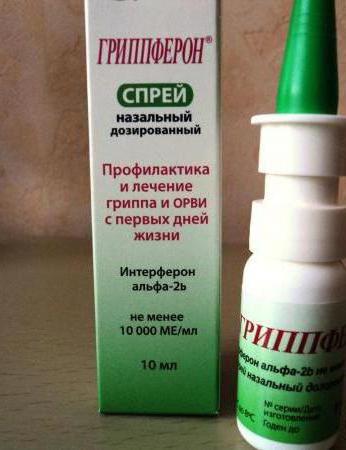
Complex preparations based on sea water
Will a preparation based on sea water (spray) help with a runny nose and congestion? Such medications are considered safe and are suitable for long-term use. The most popular are the following trade names drugs: “Akvmaris”, “Dolphin”, “Aqualor”, “Physiomer”, “Humer”, “Rinostop”. All medications contain an isotonic solution of sterile sea water. It is known that all the medications described can be replaced with ordinary sodium chloride solution.
How do these products work? Medicines wash the nasal passages, moisturize the mucous membranes, which improves a person’s breathing and relieves him of crusts in the nose. The drugs are also effective against runny nose and nasal congestion. The spray (any of those mentioned) contains salt. She pulls out excess liquid from edematous tissues. Due to this, hyperemia decreases. When rinsing the nasal passages, excess mucus with pathogenic microorganisms is also removed. All this contributes speedy recovery and a gradual decrease in the amount of secretion released.
Vasoconstrictors: decongestants
It is believed that the best sprays for runny nose and nasal congestion act immediately. The drugs quickly relieve swelling by constricting blood vessels. Within a few seconds after use, the person begins to breathe normally. The effect of vasoconstrictor drugs lasts from 2-3 to 8-12 hours. Much depends on the active ingredient. Which remedy for runny nose and nasal congestion (spray) should I choose?
- "Galazolin", "Otrivin", "Snoop". They contain the active ingredient xylometazoline. The effect of use lasts for 8 hours.
- “Nazivin”, “Nazol”, “Noxprey”. The medication contains oxymetazoline. These products work for about 12 hours.
- "Sanorin" and "Naphthyzin" remain effective for 4-6 hours. The main component of the drugs is naphazoline.
- "Tizin Xylo" includes tetrizoline. Works for 4 hours.
All of these medications should not be used for more than five days. The optimal treatment period is three days. If you use the compounds for a long time, you may become addicted to them. Please note that not every spray for runny nose and nasal congestion can be used for children. Many medications are limited to one, two or six years. Use caution when using these medications. Don't use them thoughtlessly. Before applying the medication to the nasal mucosa, rinse it. During the day, use short-acting vasoconstrictors. At night you can apply more strong medicine. Stop using the nasal spray as soon as you can breathe normally. Remember that these drugs do not cure. They only relieve the symptoms of rhinitis and make breathing easier for a while.
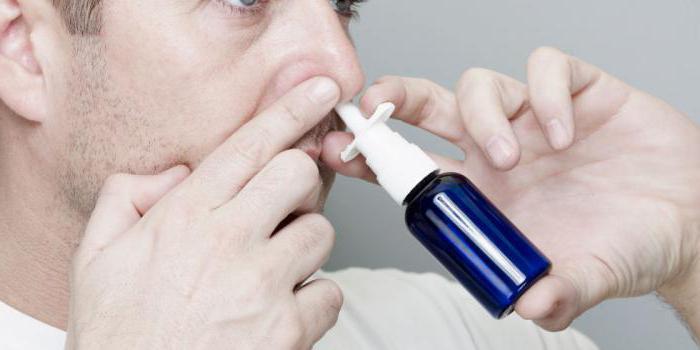
Corticosteroid medications
Which one to use Without a runny nose, the presence of edema is often a consequence of improper use of vasoconstrictor medications. At the same time, you may hear from doctors a diagnosis of “medicinal rhinitis.” Corticosteroids are used to correct it. These are hormonal nasal sprays that make breathing easier. Note that all drugs begin to act after some time. Don't expect immediate results.
The most popular corticosteroid nasal agents: Avamys, Nasonex, Tafen. You can buy them at the pharmacy without a prescription. But they should not be used thoughtlessly. The drug must be prescribed by a doctor. A corticosteroid spray for nasal congestion (without or with a runny nose is not so important) is used for a long time. The withdrawal of the drug occurs gradually. The maximum effect of use is achieved within 2-4 days. Also, similar compositions are prescribed for the treatment of allergies and acute respiratory infections in the nose.
Unique "Rinofluimucil"
What other spray can you buy for a runny nose and nasal congestion? The list of the best continues with a medicine based on acetylcysteine. His tradename"Rinofluimucil". The nasal spray relieves swelling, thereby improving breathing and normalizing the patient’s general well-being. The drug also has an anti-inflammatory effect, which speeds up the healing process. The medication has a mucolytic effect. It liquefies thick mucus, accumulating in the sinuses. If congestion is caused precisely by this factor, then other described medications may be powerless.
An effective spray for runny nose and nasal congestion “Rinofluimucil” is used for no more than one week. It is prescribed for acute and chronic rhinitis, sinusitis, and sinusitis. It is important that this medication can only be used by children after three years of age. There are different reviews about this nasal remedy. Many consumers say that at the beginning of its use, the runny nose intensifies: the amount of mucus discharge increases. But this does not mean that the medication does not help you. The medicine is known to have a mucolytic effect. Due to it, the secretion is liquefied and removed outside. This action prevents further inflammation and the addition of bacterial flora.

In case of bacterial infection
What is the most effective for a runny nose and nasal congestion? An antibacterial spray is used when a corresponding infection is confirmed. ABOUT bacterial rhinitis report following symptoms: green snot, severe swelling and congestion. Often all this is accompanied by pulsation in the frontal lobe.
To relieve swelling and eliminate bacterial rhinitis, you need to use the drug "Polydexa". This and nasal congestion - spray. It contains an antibacterial component and phenylephrine. The latter, in turn, helps to narrow blood vessels and normalize the condition of the nasal mucosa. The use of the drug lasts from 5-7 to 10 days. For children under 3 years of age, Polidexa runny nose spray is contraindicated. Also, the medicine is not prescribed to expectant mothers and nursing women.
Reviews report that Polydex spray allows you to “kill two birds with one stone.” During therapy you receive an antibacterial effect and also provide symptomatic treatment. Phenylephrine relieves congestion and itching. This component has an antihistamine effect.

Allergic nasal congestion
What are the best sprays for runny nose and nasal congestion? If swelling and mucus discharge are caused by an allergic reaction, then you should definitely consult a doctor. With the help of simple laboratory research The doctor will find out the cause of your discomfort. Based on this, further therapy is prescribed. Most often prescribed antihistamines for oral and intramuscular use. But there are situations in which a person cannot accept them. Then doctors give preference to nasal drops and sprays. How to relieve nasal congestion and eliminate runny nose due to allergies?
"Sanorin-Analergin" includes naphazoline, which has a vasoconstrictor effect and has a short-term effect. The drug also contains antazoline, an antihistamine. After application to the mucous membranes, the maximum effect occurs. It is important that the medicine can only be used for five days. If there is no improvement during this time, then you should contact your doctor again to adjust the treatment.
"Vibrocil" is another remedy for the treatment of congestion and runny nose of an allergic nature. The drug contains phenylephrine and This spray can be used for children, but only from the age of six. The medication perfectly relieves nasal congestion and freshens breath. It relieves all symptoms of an allergic reaction, including copious mucus secretion. The vasoconstrictor effect is reversed by phenylephrine. The second component, dimentindene maleate, blocks the functioning of histamine receptors without affecting the activity of the ciliated epithelium of the nasal mucosa.
Corticosteroids are also used to treat congestion. The list of drugs is presented to your attention above. It is worth remembering that nasal spray alone is not enough. Of course, the compounds will make breathing easier. But they won't fix the problem without your efforts. In case of allergic rhinitis, it is necessary to exclude the source of irritation.
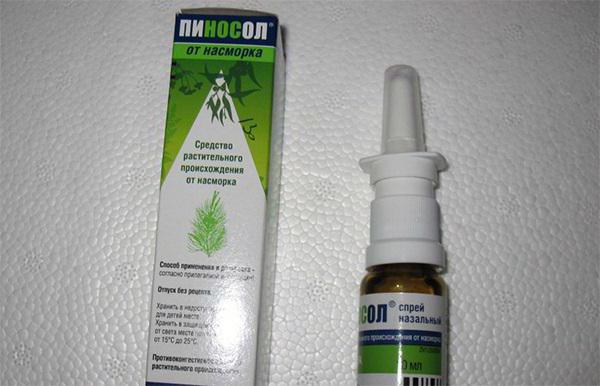
Herbal ingredients for the treatment of runny nose and congestion
To treat swelling in the nose and eliminate snot, you can choose preparations based on vegetable oils. These include “Pinosol”. This medication costs an average of 300 rubles. According to reviews, it helps well against runny nose and nasal congestion. A cheap spray (an analogue with the same effect) is the drug “Pinovit”. The composition of the drugs is approximately the same. These include vegetable oils: mountain pine, peppermint, eucalyptus. Thymol and vitamin E are also present. If a runny nose is caused by addiction to vasoconstrictor drops or we are talking about atrophic rhinitis, then these drugs will be one of the best. They do not affect the vessels of the mucous surface, and, therefore, are not addictive. Medicines refresh and facilitate breathing, soften the mucous membrane, eliminate crusts, and promote the healing of damaged areas.
The use of Pinosol and Pinovit sprays is contraindicated for allergic rhinitis and congestion. In this case, your actions will only worsen your health. It is also prohibited to use the medicine in spray form in children under 2 years of age. It is important that the medications described can be prescribed during pregnancy. If expectant mother there is no allergy to any component, then she can safely use herbal preparation, which will help with runny nose and nasal congestion.
Spray: reviews of drugs for the treatment of runny nose
If you turn to consumers, you can hear a variety of opinions about drugs. Doctors cannot give feedback on the described remedies as a whole, since they are all intended for different cases.
According to medical opinion, the safest are seawater-based sprays. They partially relieve swelling and cleanse the nasal mucosa. But the effect of such drugs does not always meet consumer expectations. If nasal congestion is severe and is caused precisely by vasodilation, then seawater-based cleansers may seem useless. In such a situation, it is advisable to use vasoconstrictor sprays. For allergies, they can also be used, but for a limited time only. If the reaction is caused by a strong irritant with which you constantly have to come into contact, then you should give preference to glucocorticosteroids.
Antiviral and antibacterial compounds are used for infectious process caused by the action of microorganisms. It is better to determine it from a doctor, since it is very difficult to make a correct diagnosis on your own. Herbal compositions are in great demand among pregnant and lactating women. New and expectant mothers say that such medications are effective and safe. They can be used for a long time (unlike vasoconstrictor sprays).
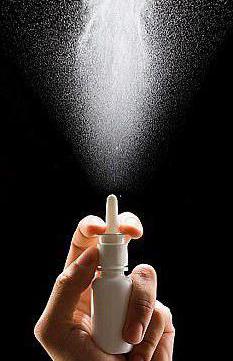
additional information
Consumers often wonder: what to choose to treat a runny nose and congestion? What is the superiority of sprays? Can they be used by children?
Sprays for treating a runny nose and eliminating nasal congestion have an advantage over medications in the form of drops. The spray nozzle allows you to irrigate the mucous membrane evenly. Small droplets get into even the most difficult to reach areas. This is a significant advantage of sprays over drops. The advantage of many drugs is that active ingredient practically not absorbed into the bloodstream. He works locally. It is worth noting that many drugs in the form of sprays are prohibited for use in children. For example, vasoconstrictor compounds are contraindicated for up to one year (and some up to six years). Antiviral drugs can be used from birth, while antibiotics are prescribed from 2-3 years.
The safety of using sprays in infants remains controversial. Children of the first three years of life have a special structure of the ear canal. The tube connecting the nose and ears is short and wide. If you administer the medicine under pressure (by spraying the medicine), the active substance along with pathogenic microorganisms will enter the Eustachian canal. The consequence of such treatment will be otitis media. As a result, you will not only not help your baby cope with a runny nose, but will also worsen the child’s condition. Do not self-medicate. Be sure to consult your doctor before using any nasal spray.
Summarize
From the article you learned which spray you can choose for a runny nose and nasal congestion. Reviews and reviews of drugs are presented to your attention. If you use the composition yourself, be careful. The lack of effect within three days should prompt you to see a doctor. You should also consult a doctor in the following cases:
- if you joined headache or shoots in the ear;
- mucus secreted from the nose has purulent impurities (green or yellow);
- nosebleeds are noted;
- the symptoms of the disease intensified (sneezing, lacrimation appeared);
- body temperature rises;
- have a sore throat;
- there is a feeling of snot running down the back wall throat (often accompanied by a nightly obsessive cough);
- the nose is so blocked that even vasoconstrictor medications do not help.
All of these signs indicate that the medication you have chosen is not suitable for treatment. Therefore, its further use is inappropriate. At severe congestion and a runny nose, an otolaryngologist will help you. All the best, breathe freely!
It is very difficult to feel comfortable when your nose is stuffy and has a runny nose. As such, these ailments are not terrible, but they greatly complicate life: the sense of smell and appetite disappears, lack of oxygen torments, headaches and a dry throat. Deal with these unpleasant symptoms A spray for nasal congestion will help. This is the most modern and easy-to-use drug.
Today, pharmaceuticals can offer a huge number of such products. How can you avoid making a mistake with your choice and purchase the most effective one? The information below about the most popular aerosols will help you do this.
Benefits of the spray
Aerosols are very convenient to use. Unlike nasal drops, they are a fine suspension medicinal substance, which, when pressed on the dispenser, is sprayed into the nasal cavity.
The spray has a number of advantages compared to conventional drops:
- The patient does not have to throw back his head or take a horizontal position when administering the medicine, which allows him to use the drug anywhere: at home, at work or in the car.
- A fine suspension is capable of penetrating into the most remote corners of the nasal cavity.
- Thanks to its small size, the can is convenient to take with you, putting it in your purse or pocket.
- The aerosol allows you to accurately dose the drug. During instillation, you can make a mistake with the number of drops and accidentally introduce nasal cavity a large number of drug.
The drug in the form of a spray is able to penetrate into the most inaccessible corners of the nasopharynx
Complete sealing of aerosols ensures long-term storage and protection from the introduction of microbes. In addition, when applied topically, the spray is practically not absorbed into the blood, so there is no need to worry about overdose and adverse reactions.
Mechanism of action
What is the secret of the effectiveness of sprays? The medicinal substance under pressure is evenly distributed throughout the entire nasal cavity and reaches maxillary sinuses. At the same time, the coverage area is much wider than when using liquid nasal products.
Drops often simply flow from the nasal cavity into the throat without having any effect. therapeutic effect. The spray penetrates into the most inaccessible places, quickly relieves swelling and restores breathing.
By settling on the nasal mucosa, the aerosol has a therapeutic effect on inflamed tissues much longer than liquid preparation or ointment.
Nasal aerosols and their types
The pharmacy chain offers a large number of all kinds of nasal preparations, which differ from each other in composition and effect on the mucous membrane.
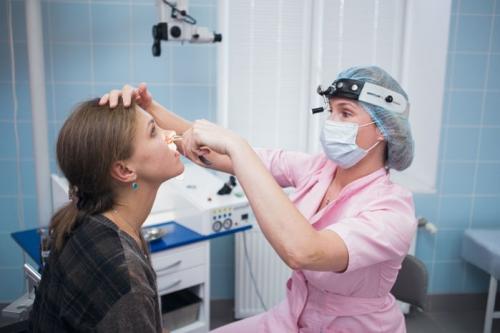
Only an otolaryngologist, after a diagnostic examination, can determine the root cause of nasal congestion and recommend a suitable spray.
Aerosols are conventionally divided into several groups, focusing on the reasons that caused nasal congestion:
- decongestants and vasoconstrictors;
- anti-inflammatory medications containing antibiotics;
- moisturizing aerosols and nasal solutions for rinsing the nose;
- homeopathic medicines;
- allergy medications;
- group of combined agents.
To choose the right nasal spray, you need to determine the causes of congestion. There can be many of them - acute respiratory infections, acute respiratory viral infections, allergic rhinitis, dry or dusty air, bacterial infection.
Therefore, to make a correct diagnosis, you should contact an otolaryngologist and only after that start choosing a suitable aerosol.
Nasal decongestants
This is the widest and most popular group of nasal medications. Vasoconstrictor spray gives quick relief, relieving the symptoms of the disease, but does not eliminate the cause of the ailment.
All products in this series are addictive, so they should be used with caution. It is necessary to follow the dosage indicated in the annotation and not to use the medicine for longer than the prescribed time.
Lazolvan Rino
The drug is based on tramazolin and is characterized by fast and powerful action. The effect lasts for 9–10 hours.

Lazolvan Rino eliminates congestion, refreshes and moisturizes
The spray has a gentle effect on the nasal mucosa, since its composition, in addition to the main active substance, includes eucalyptol, camphor and the menthol isomer. In pediatrics, Lazolvan Rino is used from 6 years of age. Caution is required for pregnant women and consultation with a doctor is necessary.
Afrin
The classic Canadian aerosol for nasal congestion contains oxymetazoline, which eliminates swelling of the mucous membrane within 15 minutes. The drug is quite expensive, but it works for a long time. Prohibited for children under six years of age.
Afrin Extro spray is considered more effective. It contains menthol and camphor, which enhance medicinal properties facilities.
Afrin Moisturizing contains glycerin and macrogol. Additional components help retain moisture in the nasal mucosa, which helps protect it from dryness and irritation.
All three Afrin sprays can be addictive, so using them for more than 3 days is not advisable. If after this period the need for their use still remains, it is necessary to consult with an otolaryngologist.
Otrivin
Swiss spray based on xylometazoline. The drug is not cheap, but effective. Available in different concentrations, so it can be used for both adults (1 mg per milliliter) and children (0.5 mg per milliliter).

Otrivin is produced in different concentrations, so it is suitable for children and adults
Otrivin with menthol and eucalyptus additionally contains levomenthol and eucalyptol, which have a refreshing effect.
The use of the drug strictly according to the instructions does not cause overflow of blood vessels and irritation of the mucous membrane. The action of Otrivin begins 6–7 minutes after irrigation and lasts at least 11–12 hours.
Rhinonorm
Budget spray based on xylometazoline hydrochloride. In addition to the active component, it contains glycerol and citric acid.
Depending on the purpose, 10 mg Rinonorm may contain:
- 5 mg of active substance in a spray for children;
- 10 mg xylometazoline in a product for adults.
The aerosol begins to act from the first seconds of spraying and remains effective for 4–5 hours. Strictly contraindicated for children under 2 years of age.
A nasal spray containing xylometazoline hydrochloride and sea water makes breathing easier within 3 minutes of use. The drug continues to act for 5–6 hours.
Snoop is sold in soft 15 ml bottles equipped with a dispenser. Each container contains 150 doses of the medicinal substance. Children's spray is available in containers of the same volume, but with a lower concentration - 0.05%.

Snoop is contraindicated for children early age up to 2 years
Despite its gentle composition and excellent moisturizing properties, the aerosol has a number of contraindications:
- early childhood (up to 2 years);
- atherosclerosis;
- increased blood pressure;
- chronic rhinitis;
- first trimester of pregnancy.
Snoop should not be used for more than a week. IN open form can be stored for no more than 3 months.
Xylene
Vasoconstrictor spray is available in standard bottles of 10 and 15 ml. The substance facilitates breathing, reduces swelling and blood filling of the mucous membrane during a runny nose for 11–12 hours.
This is a dosed spray of Italian origin based on acetylcysteine (1 gram) and thauminoheptane sulfate (0.5 grams)

Rinofluimucil has a vasoconstrictor effect and thins mucus
Helps with all types of runny nose, even chronic and persistent ones. Like other drugs of the vasoconstrictor group, with long-term use addictive. The drug is not recommended for children under 3 years of age and pregnant women. The effect of Rinofluimicil begins immediately after application and lasts 7–8 hours.
Aerosols for allergies
In the treatment of simple and rapid allergic reactions of a seasonal nature, vasoconstrictors are usually used. But more serious disorders in the body force one to resort to medications with pronounced antihistamine and anti-inflammatory effects.
Aerosols based on glucocorticosteroids have an intense antiallergic effect. They can be used all year round. The drugs perfectly eliminate symptoms such as runny nose, congestion, swelling and itching in the nose, and redness of the eyes.
However, you shouldn't get carried away with them. Hormonal agents have many contraindications, so when using them you must strictly adhere to the instructions.
When using nasal aerosols for allergies, no matter how well they help, you should remember that these drugs do not treat the immunopathological process, but only eliminate the symptoms and make life easier for a while.
The British aerosol based on fluticasone quickly penetrates the nasal mucosa and reaches certain receptors. By interacting with them, the spray eliminates swelling and itching, reduces mucus secretion and reduces the feeling of nasal congestion.
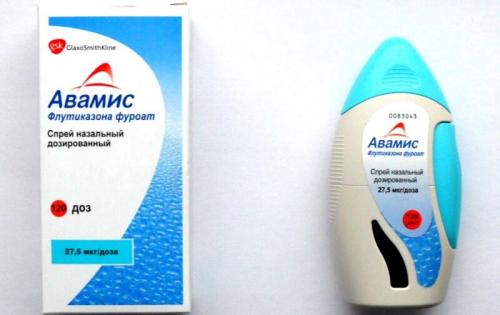
Avamis quickly and effectively relieves allergy symptoms
Avamis is used to relieve signs of seasonal and year-round runny nose in both adults and children. It is effective only against allergic rhinitis. For a runny nose caused by viruses or bacteria, Avamis will not have any therapeutic effect, but will only worsen the problem.
The spray begins to act immediately after injection and continues to work for at least 8 hours. However, complete disappearance of allergy symptoms occurs only 2–3 days after the start of therapy. The product should not be used more than once a day. Avamis is prohibited for children under 6 years of age.
Vibrocil
Another popular drug known Swiss company. The spray contains active ingredients:
- phenylephrine;
- dimethindene maleate;
- lavender oil and other ingredients.
![]()
Vibrocil has vasoconstrictor and antihistamine properties
Vibrocil has a combined effect on the mucous membrane - vasoconstrictor and antiallergic. It has a minimum of side effects and is suitable for use by children and pregnant women.
Aflubin Naze
The homeopathic medicine has a gentle effect on the nasal mucosa, without drying or irritating it, and is not addictive.
The spray contains:
- milkweed juice;
- meadow lumbago;
- black mustard;
- luffa and other excipients.
Aflubin Naze can be sprayed onto the nasal mucosa 7–8 times a day.
Aerosols for sinusitis
If you have inflammation of the paranasal sinuses, you cannot do without using products containing antibacterial additives. In this case, finely dispersed drugs are very important local application. Due to their properties, aerosols are able to penetrate directly to the source of inflammation.
Miramistin
Original drug Russian production has antiseptic and antibacterial effect. It has practically no contraindications. You could say that this is the best choice to eliminate the symptoms of sinusitis in children and pregnant women.
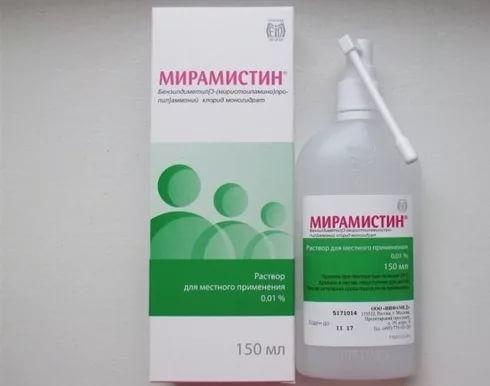
Miramistin is safe for children and pregnant women
Miramistin is effective both at the onset of the disease and during chronic development pathology. The course of treatment is 7–12 days.
Sinuforte
Spanish-made spray activates local immunity, thins mucus in the sinuses and promotes its removal.
For uncomplicated sinusitis, the aerosol can be used as monotherapy, but only as prescribed by a doctor.
Sinuforte is especially effective in postoperative period. The drug eliminates swelling and improves drainage maxillary sinuses. This allows you to avoid relapses of the disease. The use of Sinuforte is possible only after consultation with an otolaryngologist.
Despite its natural composition, the spray has some contraindications:
- sensitivity to the components of the drug;
- period of pregnancy and lactation;
- increased blood pressure;
- children's preschool age.
Isofra
The product is based on framycetin, an antibiotic from the aminoglycoside group for topical use. The course of therapy should not last more than a week, otherwise the likelihood of microflora imbalance increases.
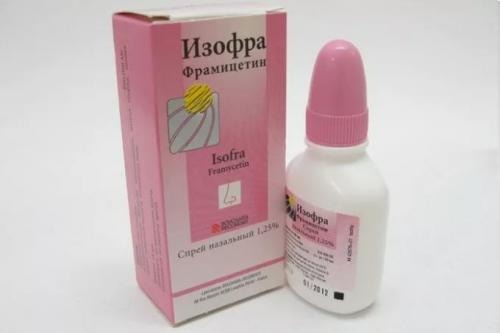
Isofra spray is one of the best remedies for sinusitis
Isofra is not vasoconstrictor drug, therefore it is used in combination with medications that eliminate swelling and nasal congestion. In general, the drug is well tolerated by patients and has no contraindications. The only point is that the spray is prohibited for children under one year old.
Polydexa with phenylephrine
Combined drug for local irrigation of the mucous membrane. It has a pronounced anti-inflammatory, vasoconstrictor and antibacterial effect.
The medication should be used as prescribed by a doctor and for no longer than 10 days. In pediatrics, Polydexa is used only from 12 years of age. Therapy for young children is possible only under the strict supervision of an otolaryngologist.
Treatment of polyps
Nasal aerosols give good result on early stage polyposis. The drugs are most often part of complex therapy and quickly relieve the symptoms of the disease. To combat pathological growth antihistamines are used in the mucous membrane.
Nazarel
Since polyposis is often caused by allergic rhinitis, Nazarel is most often used to eliminate the symptoms of illness. After just 1.5 hours, the drug noticeably reduces itching and discharge from the nasal cavity, redness of the eyes and face.
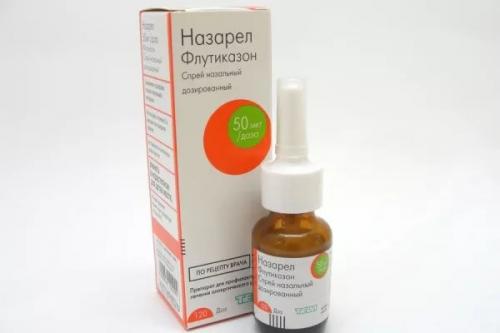
Antihistamine spray Nazarel is used to treat polyps
Suitable for therapy of children over 4 years of age and adults. Contraindicated during pregnancy and breastfeeding.
Nasonex
For nasal polyposis, Nasonex can be prescribed to patients over 18 years of age. For pregnant women, the use of the spray is permissible only if the expected result is higher than the possible risk.
Possible adverse reactions:
- the appearance of nosebleeds;
- irritation of the mucous membrane, burning sensation and dryness;
- pharyngitis;
- headache.
Due to the low absorption of the drug, an overdose is unlikely.
Aerosols for moisturizing mucous membranes
This is very large group nasal products based on sea water. Drugs in this series will be especially useful in cases where nasal congestion is caused by dry or dusty air.
In addition, they are often used to prevent rhinitis and hygiene of the nasal mucosa. Moisturizing aerosols are effective and safe, so they can be used daily.
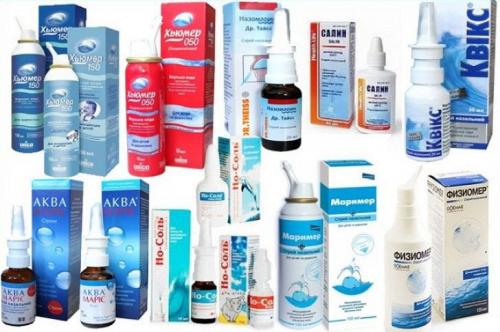
Moisturizing sprays effectively cleanse the mucous membranes, relieve congestion and speed up recovery.
Well suited for treating babies from the first days of birth.
The list of nasal moisturizers is endless, so here are the most famous ones:
- Aqualor. There are several types of spray: Aqua Norm, Aqua Forte, Aqua Extra and Aqualor Baby, Aqualor with aloe and chamomile;
- Marimer;
- Vivasan;
- Morenasal;
- Quicks;
- Humer;
- Physiometer;
- Aqua Maris Series;
- AquaMaster and others.
Adriatic salts reduce the risk of complications (otitis, sinusitis) and speed up recovery.
Often aerosols with sea water prescribed after removal of polyps and adenoids. The drugs improve local blood circulation, increase immunity, eliminate swelling of the mucous membrane and make breathing easier.
Aerosols for nasal congestion in pediatrics
In children's practice, only those aerosols that are created specifically for children are used. Adult medications may cause serious complications, and some of them have an extremely negative impact on physical development baby.
Only an otolaryngologist or pediatrician can determine which spray for a runny nose and nasal congestion is suitable for a child.

In pediatrics, only special children's sprays are used
In general, to relieve nasal congestion in childhood You can use vasoconstrictor aerosols containing oxymetazoline, xylometazoline or phenylephrine:
- Nazivin (0.01 and 0.025%);
- Nazol Baby, Nazol Kids, Nazol Advance;
- Vibrocil;
- Sanorin;
- Tizin Xylo;
- ForNose;
- Otrivin.
They all have different durations actions, but aerosols are more effective, which relieve nasal congestion for at least 12 hours. They should be used at night.
For treatment allergic rhinitis Suitable for child Vibrocil or Rinofluimucil. Antihistamines based on hormones (Nasonex, Beconase) can only be used from 6 years of age.

If a child over 6 years of age has an allergic runny nose, Nasonex can be used.
If rhinitis is bacterial in nature, the baby is prescribed Framycetin or Bioparox, but only after 3 years. And for treatment infectious rhinitis Polydex is usually prescribed.
As you can see, the choice of drugs for nasal congestion in childhood is quite wide. They are all for short term They make breathing easier and have a minimum of contraindications, but they are recommended to be used only as prescribed by a pediatrician.
For children under the age of one year, the use of the spray is prohibited. In this case, doctors recommend using nasal drops.
Nasal decongestion spray - medicine local action, equipped with a dispenser for injecting solution into the nasal passages. Depending on the composition, a nasal aerosol may have anti-inflammatory, immunostimulating, antiallergic, wound-healing, decongestant, antibacterial and disinfecting effects. Medicines in spray form irrigate almost all inner surface nasal passages and part of the maxillary sinuses, thereby achieving the maximum therapeutic effect.
If the dosages are observed, local drugs do not have a systemic effect on the body. The components of nasal aerosols are practically not absorbed into the blood, therefore they are used to treat rhinorrhea, nasal congestion, sinusitis and nasopharyngitis in adults and women during pregnancy. The publication discusses lists of the best sprays, their operating principle and application features.
What it is?
Spray is a special form of nasal drug, which is produced in an aerosol package equipped with a special dispenser. Unlike droplets, aerosols cover almost the entire surface of the mucous membrane and are not poured into the laryngopharynx. Particles of the medicinal suspension easily penetrate the paranasal sinuses, thereby reducing the likelihood of developing sinusitis.
Nasal sprays have many advantages over drops. The main ones include:
- no need to take a horizontal position for use local drug;
- the ability to strictly dose the amount of medicine used;
- achieving maximum therapeutic effect due to uniform spraying of the aerosol in the nasal cavity;
- economical consumption of medication compared to nasal drops;
- comfortable injection of spray into the nose under any conditions - on the street, in transport, in the office, etc.
Injecting an aerosol into the nasal passages that are not cleared of mucus can provoke infection into the paranasal sinuses.
It must be remembered that aerosol preparations are injected into the nose under pressure. In this regard, infected exudate (nasal secretions) can enter the paranasal sinuses. To avoid complications, it is recommended to blow your nose or rinse the nasal cavity with saline solution before the procedure.
Groups of nasal sprays
It is quite difficult to understand the variety of nasal medications offered by pharmaceutical companies. The pharmacy will offer you a choice of at least 10 types of aerosols, but only some of them will have the necessary therapeutic effect. The choice of topical drug depends on the etiology, i.e. causes of rhinitis or nasal obstruction (obstruction) of the nasal passages.
Depending on the pharmacological properties of aerosols, the following groups of local drugs can be distinguished:
- antiseptics – disinfect mucous membranes and destroy infections of microbial, viral and fungal nature;
- corticosteroids - inhibit inflammatory reactions, used to treat vasomotor and allergic rhinitis;
- antihistamines - relieve swelling and relieve nasal obstruction;
- homeopathic - stimulate local immunity and accelerate cell regeneration in the nasal mucosa;
- moisturizing – prevent dehydration of the mucous membrane and disruption secretory function glands in the nasopharynx;
- antibiotics – destroy bacteria and prevent the development of purulent processes;
- alpha-adrenergic agonists (anticongestants) – constrict blood vessels, reduce swelling and secretion of nasal mucus.
Knowledge of the pharmacological properties of medications allows you to select the appropriate spray for a runny nose of allergic, viral, microbial or fungal etiology. It should be understood that overdose and abuse of aerosols of certain groups, in particular alpha-adrenergic agonists and glucocorticosteroids, can lead to serious complications.
Review of the best drugs
The main requirement for aerosols is that they not only eliminate the symptoms of nasal obstruction, but also promote recovery. As a rule, nasal sprays are not used as monotherapy in the treatment of ARVI, sinusitis or nasopharyngitis. A runny nose is only one of the manifestations of the underlying disease, so for speedy recovery functions of the respiratory organs, you need to take medications with etiotropic action, i.e. systemic antibiotics, antivirals etc.
Rhinitis and nasal congestion are not independent diseases, but symptoms that can only be eliminated if the cause of the disease is eliminated, i.e. infections.
Aerosols based on sea water are the safest nasal products that can be used without restrictions. They include useful microelements, which have a beneficial effect on the condition of the nasal mucosa. They are indicated for rhinitis and sinusitis of almost any origin.
Depending on the concentration of sodium chloride in the medicine, several groups of moisturizing aerosols are distinguished:

It is undesirable to use hypotonic solutions for obstruction of the nasal passages. Their use only increases swelling in the mucous membrane and therefore aggravates the course of the disease. These drugs are used in the treatment atrophic rhinitis and dryness in the nasal mucosa.
Anticongestants
Sprays containing adrenaline receptor stimulants are classified as symptomatic medications. They relieve the manifestations of nasal obstruction, but do not promote healing of the mucous membrane. Such drugs should be used with caution, as their active components affect vascular tone.
When using anticongestants for more than 7 days, the so-called “rebound” syndrome often develops. When aerosols are abandoned, the blood vessels dilate, which leads to excessive blood supply to the mucous membrane and swelling. This forces a person to use medications constantly with increasing dosages.
Alpha adrenergic agonists for frequent use prevent the secretion of nasal mucus, which leads to tissue dehydration and nosebleeds.
- "Knoxprey";
- "Nazol";
- "Nesopin";
- "Sanorin";
- "Snoop";
- "Tizin-Xylo";
- "Lazolvan Rino."
Depending on the composition, some decongestants last no more than 3 hours, while others last at least 12 hours. For severe rhinitis and before bedtime, it is advisable to use long-acting medications.
Antihistamine sprays
Allergic reactions affecting the respiratory tract provoke severe tissue swelling, difficulty in nasal breathing, sneezing, lacrimation, itching in the nasal cavity, etc. Progression of the disease can cause obstruction of the eustachian (auditory) tube and, as a result, dysfunction auditory analyzer. To reduce the severity of inflammation and symptoms, antihistamine aerosols are used.
Antihistamines are a separate group of drugs that suppress the action of inflammatory mediators, i.e. histamines. Some medications act directly on mast cells, preventing their destruction and the release of inflammatory mediators, while others reduce the sensitivity of histamine receptors. To cope with the manifestations of hay fever and year-round allergic rhinitis, it is recommended to inject the following drugs into the nose:
- "Lecrolin";
- "Tizin Allergy";
- "Allergodil spray";
- "Cromohexal".
At severe course allergies antihistamines used together with topical glucocorticosteroids. Hormonal drugs eliminate allergic inflammation and restore the patency of the nasal passages.
Hormonal aerosols
Nasal glucocorticosteroids can be classified as “first aid” medications. They have pronounced antiallergic, decongestant and antiphlogistic (anti-inflammatory) properties. Sprays with synthetic steroid hormones facilitate nasal breathing, eliminate obstruction and prevent the development of complications - sinusitis, sinusitis, nasopharyngitis, etc.
An overdose of glucocorticosteroids is fraught with atrophy of the mucous membrane, increased intraocular pressure and a decrease in local immunity.
Hormonal aerosols are more often used in the treatment of allergic rhinitis accompanied by severe rhinorrhea. TO the best means this group includes:
- "Rinoklenil";
- "Beclomethasone spray";
- "Tafen Nazal";
- "Momat Rhino Advance";
- "Desrinitis."
It is undesirable to use local glucocorticosteroids for treatment chronic diseases. With a decrease in immunity, there is a risk of active reproduction of opportunistic fungi in the nasopharynx. They can provoke the development of fungal rhinitis or sinusitis.
Combination sprays include medications that contain several active ingredients at once, providing them with a wide spectrum of action. In particular, the treatment of allergic rhinitis may include drugs that have both antiallergic and anticongestive effects. Such aerosols are not recommended to be combined with other nasal agents, since an excess of active ingredients can lead to irritation and even greater inflammation of the tissues of the nasopharynx.
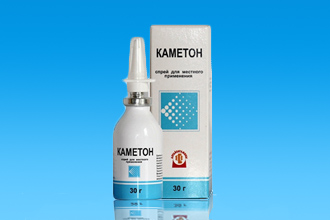 To eliminate several manifestations of rhinitis at once, it is recommended to inject the following combination sprays into the nose:
To eliminate several manifestations of rhinitis at once, it is recommended to inject the following combination sprays into the nose:
- “Kameton” – softens and disinfects mucous membranes;
- “Pinosol” – accelerates the regression of inflammation and moisturizes the nasal passages;
- "Sanorin-Analergin" - constricts blood vessels and eliminates allergic inflammation;
- "Vibrocil" - eliminates swelling and allergies.
"Pinosol" and "Cameton" are medicines plant origin. They can be used to treat otitis and eustachitis that arise as a complication of ARVI.
Preparations with antiseptic
Yellow and green nasal discharge is a clear sign of bacterial or fungal inflammation. To eliminate pathogenic flora in the nasopharynx, sprays with an antiseptic effect are prescribed. They disinfect the mucous membrane and prevent the development infectious agents, as a result of which the severity of nasal obstruction decreases.
Antiseptics are not antibiotics, so even if treatment is abandoned prematurely, pathogen resistance to the drugs does not develop.
To help cope with fungal and bacterial rhinitis:
- "Octenisept";
- "Collargol";
- "Dioxidin";
- "Okomistin".
An overdose of antiseptics often leads to allergic reactions, as evidenced by itching in the nose, difficulty breathing, lacrimation, etc. Therefore, they should be used only in the dosages indicated in the instructions for the drug.
List of inexpensive sprays
A low price does not always indicate poor quality pharmaceutical drugs. Quite often, the compositions of expensive and cheap nasal products are the same, which means that the therapeutic effect of their use will be approximately the same. Why do prices for drugs of the same group differ so much?
To search chemical formula It takes a lot for manufacturers to produce a new drug and test it. Money. As a rule, at least 10 years pass from the time a new drug is tested until it reaches pharmacies. To recoup the investment, the manufacturer is forced to increase the price.
Generics are analogues original drugs, which contain the same active substances. However, results are not required for their production and inclusion in the medical register clinical trials, therefore their price is significantly lower than the original drug. Inexpensive but effective nasal sprays include:
It is worth noting that the dosage of original drugs and their analogues may differ slightly. This is due to the fact that the concentration active substances they are not always the same. Therefore, before using medications, it is recommended to read the instructions for use of the spray.
Conclusion
Nasal spray - simple and effective method eliminating rhinitis and nasal obstruction (nasal congestion). They are equipped with special dispensers that convert liquid into an aerosol. When using nasal medications, a medicinal suspension is injected into the nose under slight pressure, so there is no need to tilt the head back or assume a horizontal position.
There are several groups of medications for intranasal administration, which differ in their pharmacological properties. Depending on the etiology (cause of occurrence) of rhinitis, antibacterial, antiallergic, antiseptic, vasoconstrictor, immunostimulating, moisturizing and hormonal sprays can be used to treat it. Aerosols combined action refer to separate group medications, since they have a complex effect on the nasopharynx and eliminate several manifestations of rhinorrhea at once.
